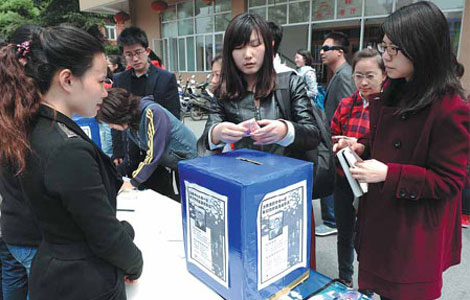A potential risk with huge M2 supply
Updated: 2013-05-10 22:48
(chinadaily.com.cn)
|
|||||||||||
China's broad money supply, or M2, has broke through the 103.6 trillion yuan ($ 16.87trillion) mark at the end of March, and whether this will trigger another bout of inflation has become a hot topic.
Some media outlets believe that we should not worry as China has a strong monetary control policy. However, in fact, we should not be so blindly optimistic as there's always the possibility of inflation risks, says an article in Beijing News. Excerpts:
Compared to other emerging economies, like India and Brazil, China has larger amounts of M2, but its current CPI is relatively lower.
However, those figures don't mean that China should not be cautious about inflation. If the household savings rate keeps declining, even if the amount of M2 stays stable, fixed deposits will flow into market, leading to a rapid increase in M0 and M1, which can also push up prices in China.
To be more specific, the downward trend in the household savings rate is quite obvious and seems irreversible. The rate declined from 62 percent in 2000 to 52 percent in 2012. If the rate decreases to less than 40 percent within the next five years, there will be nearly 5 trillion yuan flowing into the market.
Moreover, China should not rely too much on its monetary control policy to curb potential inflation. For one thing, the implementation costs are too high as the central bank of China needs to pay interests for its actions no matter if it's raising the deposit reserve ratio or trading the central bank bills. Also, using the control policy too frequently can cause side effects, like increasing the scale of shadow banking. For instance, trust loans already increased 1 trillion yuan in last year.
Since authorities still cannot figure out the exact amount of a reasonable and safe additional issue, we should be prepared for potential inflation risks, rather than easily putting down our guards now.
Related Stories
Barclays lower its forecast for China's CPI 2013-05-09 17:25
Spring Festival drives up CPI in Feb 2013-03-22 13:48
How statistical data are produced - CPI 2013-03-15 13:34
Beijing's CPI rises 3.9% year-on-year in Jan and Feb 2013-03-14 10:41
Today's Top News
China's navy forms 1st carrier-borne jet force
University president in discipline investigation
Romanian Embassy in Beijing opens its doors
Pieces of valuable screen stolen
World landscape expo opens in NE China
MOC queries World Bank China business report
Exporters urged to 'optimize'
Producer Price Index continues to decline
Hot Topics
Lunar probe , China growth forecasts, Emission rules get tougher, China seen through 'colored lens', International board,
Editor's Picks

|

|

|

|

|

|





